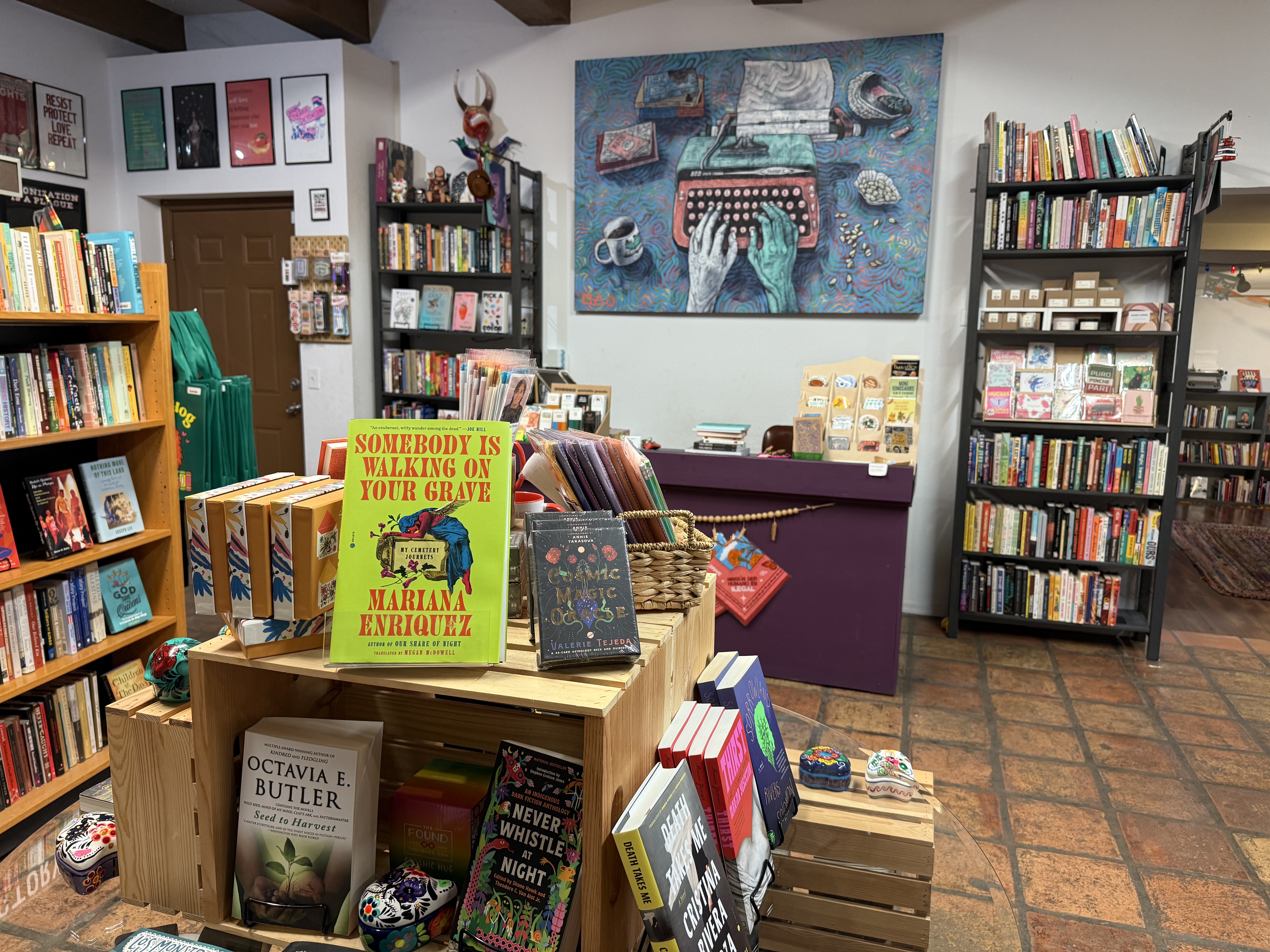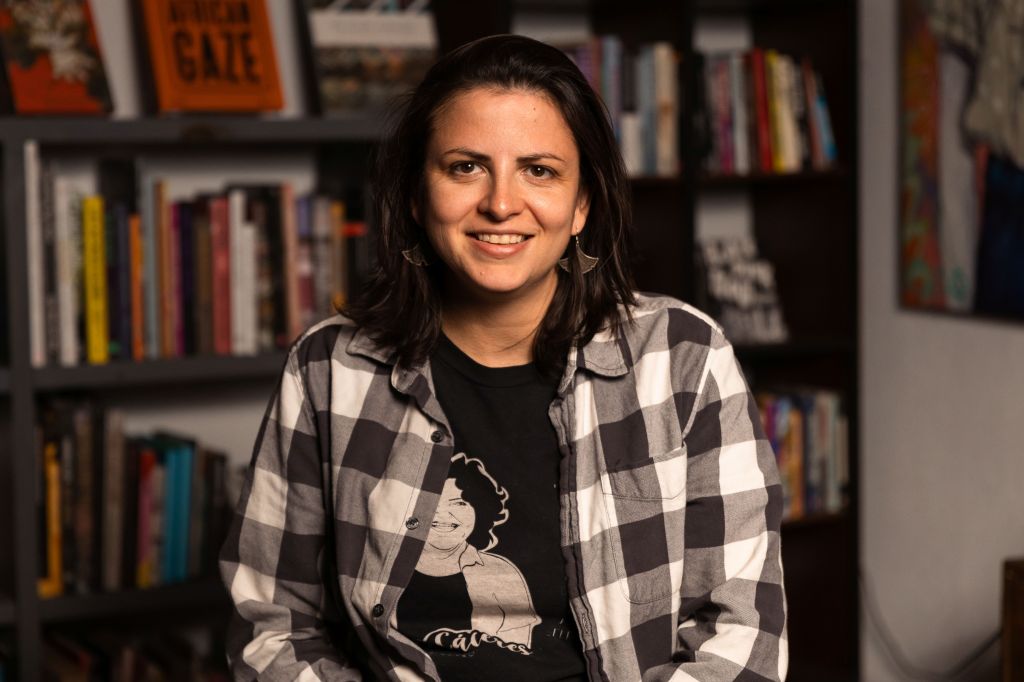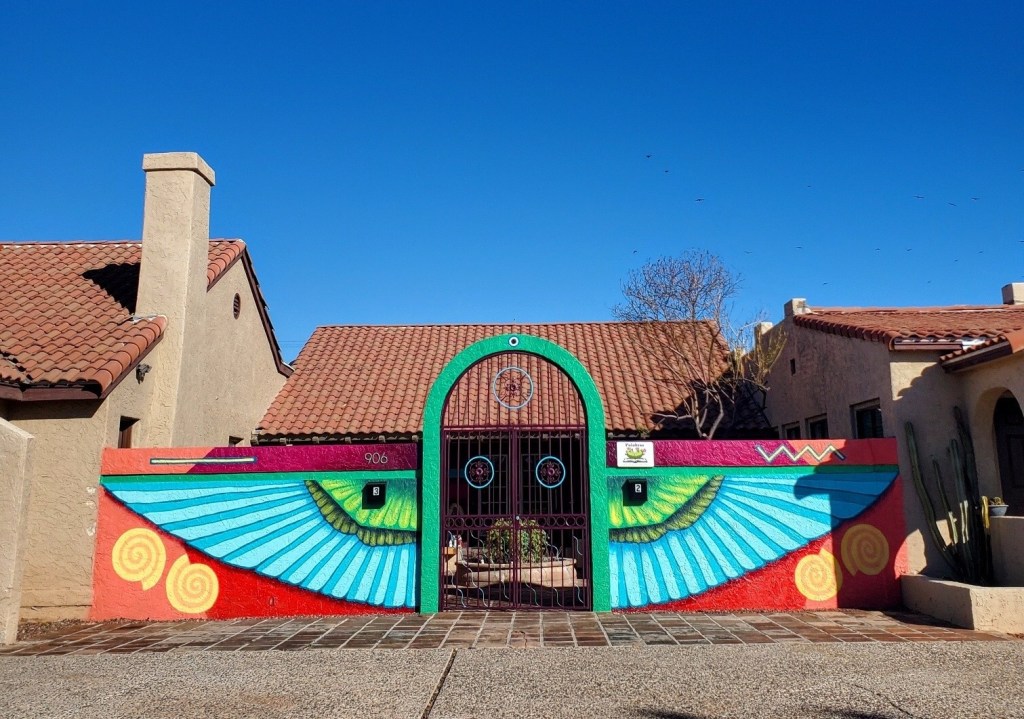

Audio By Carbonatix
When you walk into Casa Caracol in central Phoenix, the first thing you see is a welcoming courtyard filled with art and flowers
Walk farther in, and you’ll find Palabras Bilingual Bookstore, one of a handful of businesses occupying the space.
But more than simply books in Spanish and English, Palabras has for a decade been a hub for historically marginalized BIPOC communities by fostering healing, connection and social change through art, storytelling and shared resources.
And now it’s time to celebrate.
This month, Palabras will celebrate its 10th anniversary with a Liberation Lotería fundraiser on Saturday, Nov. 22, from 4 to 9 p.m.
The $70 ticket includes a theater performance telling the history of Palabras, a puppet show, food from Authentic EthioAfrican Kitchen and pozole and tamales made by the hosts. It also includes mini workshops, a snail-themed swag bag (caracol is the Spanish word for snail), a photo booth and tres leches birthday cake. You can purchase your tickets on the website.
Proceeds benefit the Casa Caracol nonprofit organization, which strives to empower BIPOC communities and elevate their contributions through art, storytelling, environment and wellness.
The next day, on Sunday, Nov. 23, those who want to continue celebrating this milestone can attend a community swap meet with cake and a piñata.

Jasmin Meza
‘Just five books on a shelf’
Rosaura “Chawa” Magaña, the steward of Palabras, is a first-generation Mexican American writer and community builder.
Palabras “started with just five books on a shelf and the intention of creating a community space that had a literary and arts focus,” she says.
Magaña’s inspiration to start the bookstore began a year and a half earlier, when a traveling bookstore and art installation featuring books in Spanish stopped in Phoenix. At the time, she was volunteering at the Mexican Consulate, where one of the cultural attachés held a Spanish-language reading with the exhibit. She was also studying creative writing at ASU, yet she hadn’t encountered an inclusive literary space in Phoenix.
“Palabras was kind of born from all of these things coming together,” she says.
Magaña says the deepest inspiration behind Palabras comes from her mother, who passed away in 2000 when she was 15. Her mother grew up in a small rancho and was the kind of person who spoke to anyone who knew Spanish and would give the shirt off her back to help someone.
It guides her vision for Palabras as a space rooted in care, healing and community.
“How can you touch people in a way that’s lasting? It isn’t all the things that you can say; it’s about how you operate in the world on a daily basis,” says Magaña. “I think about that energy and how she lived her life and how she cared for people and nurtured people.”
Ten years have come and gone, but not without challenges. One of the biggest roadblocks was learning the logistics of running a brick-and-mortar bookstore.
“Usually you start with pop-ups for a while, but I got a physical space and shared it with other people so I could afford the rent. The space ran on a swamp cooler with no air conditioning, and it was brutal, not really good for the books,” Magaña says.
“I’d tell anybody reading this to do your homework and don’t do it like I did, because I had no idea what I was doing,” she adds with a laugh.
For anyone wanting to start a similar endeavor, she advises asking for help when needed, and to trust the process, “and to let go, for God’s sake, let go.”
The financial demands of running a physical space have been a major challenge for Magaña, who at one point had a full-time job and eventually dropped out of school to pursue work that felt more meaningful.
“It felt like that was my path. It was my journey and what I was supposed to do,” she says.
Running Palabras has been especially difficult because profit margins on books are minimal, and the overhead of maintaining a space in Phoenix, including rent, is substantial. Balancing all the work with a limited number of hands has been taxing, and Magaña admits that burnout has been a real struggle.
Despite the challenges, Magaña says she has been fortunate to have guides appear along the way. In 2020, during a particularly difficult period, renowned Chicana writer Sandra Cisneros emerged as one of those guides.
Magaña had been approached for an interview on PBS NewsHour but was hesitant to participate amid the chaos of that year. Cisneros saw her on the news, reached out and even organized a small fundraiser, encouraging people to buy books from the bookstore. Magaña credits this support with helping her navigate a difficult time.
She also credits countless community members who have shown up over the years and helped sustain the project.
That support has carried Palabras through several chapters of its journey. The first Palabras location was on Grand Avenue. In 2017, the bookstore moved to McDowell Road, and at the end of 2020, it relocated again, this time to the house on Roosevelt Street.
“I feel like each location was really special and I met a lot of people who helped my mind open up to what it means to be in community,” Magaña says.

Rosaura “Chawa” Magaña
The way of the snail
The vision of Casa Caracol is to cultivate a way of thinking rooted in liberation for all communities, addressing challenges with joy, intention and a deliberate slowness. Magaña believes the space naturally supports the wide range of work taking place there, from environmental justice initiatives to arts programming that extends beyond literature.
The symbolism of the snail reflects this ethos: a reminder to slow down, remain present and stay grounded in the work.
Palabras and Casa Caracol host a variety of programs and activities to engage the community, including writing workshops, book clubs, open mics, discussion groups, local art markets, and collaborations with organizations serving BIPOC and LGBTQ+ communities.
Casa Caracol holds space for other projects like Andria’s Tienda, Xochitl PHX and Sow Art Collective. Andria’s Tienda sells jewelry and offers creative crafting workshops, Xochitl PHX specializes in plants and Sow Art Collective provides arts programming and resources to the community.
“People come in, they create something, they move on, or they expand, do different things. So it’s an incubator space, a nurturing kind of incubator space, too, for smaller projects,” says Magaña.
Looking ahead, Magaña hopes to focus on writing and rest. “Please, God, I don’t want to be there putting in inventory for the rest of my life,” she jokes. She wants others to bring fresh perspectives and help Casa Caracol continue to evolve and grow.
“Palabras was never mine to begin with. I don’t feel like it belongs to me; I was just holding it. I was nurturing it into whatever it was meant to become,” she says.
Magaña sees Palabras as a place of inspiration, where people can create their own versions of what the space represents. She hopes the bookstore sparks a ripple effect, encouraging visitors to start their own projects, whether in literature, art or other creative ventures, in their own communities. For Magaña, it’s about nurturing a community where inspiration spreads, and one act of creativity can inspire another.
The calling that started over a decade ago has brought her a lot of joy.
“Thank you to the community who supported us for the last 10 years, and helped us during some really challenging times and also all the wonderful laughs and fun that we’ve had over the years,” Magaña says. “I have so much gratitude for all of it, the whole wild thing that’s been this experience.”
Palabras Bilingual Bookstore is located at 906 W. Roosevelt St., #2. Visit the website for information and tickets to the event.